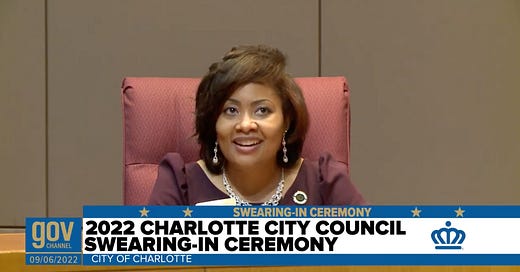A new voice for Charlotte's eastside
Plus: UNC system eyes more of out-of-state students; How did CMS incumbents vote on key issues?; Supreme Court to review UNC admissions; Rock-n-roller Jerry Lee Lewis' 1959 Charlotte show
Good morning! Today is Monday, October 31, 2022. 🎃 You’re reading The Charlotte Ledger, an e-newsletter with local business-y news and insights for Charlotte, N.C.
Need to subscribe — or upgrade your Ledger e-newsletter subscription? Details here.
Today’s Charlotte Ledger is sponsored by Providence Day School, which exists to inspire a passion for learning, a commitment to personal integrity, and a sense of social responsibility. An admissions open house is November 6 for grades TK-12. Click for details.
Q&A: Newly elected City Council member Marjorie Molina says she’s more comfortable with policy than politics; Sees ‘so much potential’ for east Charlotte
by Tony Mecia
Marjorie Molina was a graduate student at UNC Charlotte last year when friends started telling her she should think about running for political office.
Instead of blowing them off, like most of us would, Molina started taking steps to run. She had been a volunteer with different organizations and had dipped her toes into the world of politics by working for local Democratic political campaigns.
And there was an opening: Council member Matt Newton, who represented the east side, where she lived, was not going to run again to pursue a campaign for judge.
Friends like then-council member Larken Egleston started introducing her to potential supporters, and as she juggled her grad school assignments and raising two kids, she also ran a political campaign.
And it was successful: Molina, 42, beat four opponents in May’s Democratic primary and faced no opposition in July’s general election. She was sworn in as a city council member last month, one of two new faces on the 11-member panel that is stacked with better-known personalities.
In a recent interview with The Ledger, Molina reflected on that transformation from volunteer and student to City Council member. She says she’s a “community servant at heart” and that she’s much more comfortable with the policy wonk work of studying and analyzing issues than the world of politics.
Some highlights of the conversation:
On representing a diverse district: “I'm fully fluent in Spanish. That is a bridge. My children are multiracial and multiethnic. So for the last 18 years, I’ve had a multiracial and multiethnic household — not to mention the people who I lived with when I was a kid, their white American blond hair, blue eyes. So I've had already a very blended experience. It's not as foreign to me as it would be for someone who didn't have the same experiences that I have had.”
On policy vs. politics: “The politics side is not really what I've been interested in at all. It’s really the policy side, the things that can make a difference in someone's life. A lot of times we talk about policy, and we act as though the policy is purely qualitative, and although there are qualitative factors, when we deal with policy, I'm at a loss because a lot of the time, quantitative is not even a part of it. It's not even a part of the conversation.”
On fundraising: “I don't like asking for money. I feel like that's never going to be natural for me, because I feel like I'm asking for myself. Everyone kept trying to coach me along the way to say, ‘No, Marjorie, it's for the campaign — you shouldn't feel guilty.’ But I'm like, ‘But I'm asking someone for money.’ I struggle with that. I struggle with fundraising. But talking to people, yeah — I love connecting with humans of different backgrounds. That's always been a personal passion.”
On what it was like when she realized she had won the election: “Humbling. Very, extremely humbling. I graduated from school four days before the primary was over. I'm planning events and taking finals. And it was so tough. I can remember certain days where I took a nap and got up and did the same thing again. It was full on for a very long time. … So it was humbling. I can't tell you how grateful I am to be in this position.”
On what it’s like being on City Council: “It's like I'm back in grad school, because I'm studying constantly. There's an immense amount of data that you have to try and understand before a meeting, and you need a level of acumen. The one thing I would say to anybody who aspires to do this: This is not a popularity contest. This is learning, reading — I promise you, it's like a graduate degree. You are reading pages upon pages of information.”
On what she’d like to accomplish: “I would like to add value to what's been established already in east Charlotte. A lot of it has been done for me, and a lot of it, I'm going to start brand new conversations. East Charlotte has so much potential. Think about it: We're closer to uptown than SouthPark. Once people start to realize our proximity to uptown and some of the prime amenities in the city, people will eventually start to take hold, especially once we have a transportation infrastructure that supports arriving at those places. I feel like [east] Charlotte will be at some point in our future a premier destination.”
➡️ For our full conversation with council member Marjorie Molina, check out our latest episode of The Charlotte Ledger Podcast. It’s available on Apple Podcasts, Spotify, Overcast and other podcast platforms:
Today’s supporting sponsors are T.R. Lawing Realty…
… and Landon A. Dunn, attorney-at-law in Matthews:
As number of N.C. high school grads stagnates, UNC system looks to raise out-of-state cap
The UNC system is proposing increase the number of out-of-state students at five of its universities, following a similar move at five of its other campuses that took effect this year.
The proposal, discussed at a Board of Governors meeting this month, would raise the cap on out-of-state students from 18% to 25% at East Carolina, UNC Asheville, UNC Greensboro, UNC Pembroke and Western Carolina University. Admissions at the system’s most competitive universities, including UNC Chapel Hill, UNC Charlotte and N.C. State University, would be unaffected, with the cap staying at 18%.
High school grads ‘flat’: We in Charlotte are accustomed to seeing growth in everything, but the UNC system says that one thing that’s not growing is the number of North Carolina high school graduates. The system says that the pool of in-state graduates is “essentially flat,” with projections showing that the number of grads in 2030 will be about the same as it was in 2019, reversing two decades of consistent growth. Birth rates are dropping, and so is migration.
The UNC system forecasts that the number of in-state high school graduates will be the same in 2030 as it was in 2019, which helps justify increasing the number of out-of-state students at some UNC campuses. (Source: Board of Governors meeting documents)
Overall enrollment in UNC schools dropped for the first time this fall in more than a decade.
In documents presented to the Board of Governors, the UNC system says the five universities “have exhibited declining in-state freshmen enrollments and have largely exhausted in-state student demands.”
It also happens to be financially beneficial for UNC schools to allow more out-of-state residents, who pay far higher tuition than in-state students. Universities also like admitting out-of-state students because it tends to raise their average SAT scores.
The Board of Governors previously raised the out-of-state cap at the state’s five HBCUs to 25% or more. Those changes started this fall.
The Board of Governors will consider the proposal at a future meeting. —TM
‘Harmony’ on display on Elizabeth pumpkin wall
The annual pumpkin wall in Elizabeth was unveiled on Sunday, with more than 100 jack-o-lanterns and a simple message: “Harmony.”
On key votes over Covid and superintendent, where did the 4 CMS incumbents stand?
Four Charlotte-Mecklenburg Board of Education members are running for re-election next week — and curiously, the campaign hasn’t centered much on key votes they have cast over their last few years on the board.
Test scores have plunged, the district has been embroiled in lawsuits over its handling of sexual assault cases and the revolving door of superintendents is continuing. Most voter guides on the school board race just ask candidates their plans for the future, which is fine — but what about their actual votes when they counted?
We went back through our archives and dug up the votes of the four incumbents — Thelma Byers-Bailey, Rhonda Cheek, Carol Sawyer and Sean Strain — on two big issues: the Covid-era return to classrooms and the handling of then-Superintendent Earnest Winston.
Covid: Byers-Bailey and Sawyer voted consistently with the superintendent’s recommendations to extend remote learning. Strain consistently voted to return students to classrooms faster. Cheek mostly voted for quicker returns to the classroom.
Superintendent: All board members except Strain voted in 2021 to extend Winston’s contract. All incumbents running for re-election except Byers-Bailey voted to fire Winston in April.
The details:
Remote learning votes
◼️ July 15, 2020: Proposal by CMS to go to all-remote learning for start of 2020-21 school year
Voting yes: Byers-Bailey, Sawyer; said CMS would not be in a position to open safely
Voting no: Strain; said risks of keeping kids home were too great
Abstaining: Cheek; said health experts indicated it’s safe
(Source: Charlotte Ledger, July 16, 2020)
◼️ Sept. 15, 2020: Proposal by CMS to return students to school beginning Nov. 2, one week in class, two weeks remote
Voting yes: Byers-Bailey, Sawyer; who said it was sensible
Voting no: Strain, Cheek; who said they wanted students in classes faster
(Source: Charlotte Ledger, Sept. 16, 2020)
◼️ Nov. 10, 2020: Proposal by CMS to postpone return to classrooms for middle school students from November to January because of bus driver shortage
Voting yes: Byers-Bailey, Sawyer
Voting no: Cheek, Strain
(Source: Charlotte Ledger, Oct. 10, 2020)
◼️ Dec. 8, 2020: Proposal by CMS to go all-virtual until mid-January 2021, as surge of Covid cases put Mecklenburg in “red zone”
Voting yes: Byers-Bailey, Sawyer; who said students’ health was primary concern
Voting no: Strain, Cheek; who said students were suffering from remote learning
(Source: Charlotte Ledger, Dec. 9, 2020; Why CMS returned to all-remote learning)
◼️ Jan. 14, 2021: Proposal by CMS to postpone return to class until February, following country health department’s non-binding “directive” urging residents to stay home
Voting yes: Byers-Bailey, Cheek, Sawyer
Voting no: Strain
(Source: Charlotte Ledger, Jan. 14, 2021)
Superintendent votes
◼️ Feb. 23, 2021: Extend Superintendent Earnest Winston’s contract through 2025 and give him a 3% raise, add paid leave
Voting yes: Byers-Bailey, Cheek, Sawyer
Voting no: Strain
(Source: Charlotte Observer, Feb. 24, 2021)
◼️ April 19, 2022: Fire Superintendent Earnest Winston
Voting yes: Cheek, Sawyer, Strain
Voting no: Byers-Bailey
(Source: Charlotte Ledger, April 19, 2022)
—TM
Goodness gracious: Jerry Lee Lewis was panned over 1959 Charlotte show; ‘trash,’ ‘moronic,’ ‘lock up your daughter’
When rock and roll pioneer Jerry Lee Lewis played the Charlotte Coliseum in June 1959, more than 12,000 fans turned out for the loud, high-energy show. But the review in the paper the next day slammed the performer, who went on to win four Grammy awards and was inducted into the Rock and Roll Hall of Fame. Lewis, best known for hits including “Whole Lotta Shakin’ Goin’ On” and “Great Balls of Fire,” died Friday at age 87.
From The Charlotte Observer’s review on June 4, 1959, by arts editor Dick Banks:
Only one word aptly describes the Jerry Lee Lewis rock ’n roll show Wednesday night: trash!
But over 12,000 fine-looking teen-agers apparently enjoyed the whole thing.
Highlight of the dubious evening came when Mr. Lewis, a peroxide blonde character with white shoes at the southern end of his long and limber legs, implored the audience to: “Shake it, baby, shake it one time for Jerry Lee Lewis.”
This went over as very big, very funny business.
Lewis, despite manager Paul Buck’s ultimatum, once again climbed atop the Coliseum grand piano. But even this daring gesture hardly raised the evening’s entertainment past the moronic level. …
The loud speakers were turned way, way up. The only logical reason for having music that loud is that your ears feel so good when it stops! …
This wasn’t even good rock ’ n roll.
Lock up your daughter, mother, next time Jerry Lee Lewis comes to town!
—TM
From The Ledger’s events board: History of bluegrass, Verse & Vino fundraiser
Events submitted by readers to The Ledger’s events board:
Wednesday: Wednesday Night Live: The History of Bluegrass with Andrew Finn Magill. 5-9 p.m. Mint Museum Uptown at Levine Center for the Arts. Hear how a simple melody “changes its accent” as it moves across the Atlantic with a fiddle performance and mini-lecture on the roots of bluegrass in America by musician Andrew Finn Magill. Program begins at 6:30 p.m.. Cash bar. Free event.
Nov. 10: Verse & Vino. 6-9:30 p.m. Charlotte Convention Center. Verse & Vino is Charlotte Mecklenburg Library Foundation’s signature annual fundraiser. This celebration of reading, writing and the joy of libraries is shared with a community of readers and New York Times best-selling authors. This year's authors include David Baldacci, Sarah McCoy, Megan Giddings, Adriana Trigiani and Javier Zamora. $200.
◼️ Check out the full Ledger events board.
➡️ List your event on the Ledger events board.
In brief:
UNC admissions at center of Supreme Court hearing: The U.S. Supreme Court is scheduled to hear arguments today on a lawsuit challenging UNC Chapel Hill’s use of racial preferences in admissions. The suit alleges UNC’s policies improperly discriminate against white and Asian-American applicants. Justices will also hear arguments on a similar case concerning Harvard University. The ruling could reshape admissions policies across the country. (Reuters)
Nursery to close: Campbell’s Greenhouses & Nursery will close after 38 years on McDonald Avenue, in the Dilworth-South End area. It’s looking for a new home. (Biz Journal, subscriber-only)
Mixed-use with a farm: A 58-acre mixed-use development planned in Davidson would include a working farm along with housing and commercial space. Five parcels at the corner of East Rocky River and Shearer roads could include a new headquarters for Summit Coffee and a roastery and an 18-acre farm. (Biz Journal, subscriber-only)
No changes to uptown restaurant: The new owners of Alexander Michael’s in uptown’s Fourth Ward say they plan no changes. (Axios Charlotte)
Taking stock
Unless you are a day trader, checking your stocks daily is unhealthy. So how about weekly? How local stocks of note fared last week (through Friday’s close), and year to date:
Need to sign up for this e-newsletter? We offer a free version, as well as paid memberships for full access to all 4 of our local newsletters:
The Charlotte Ledger is a locally owned media company that delivers smart and essential news through e-newsletters and on a website. We strive for fairness and accuracy and will correct all known errors. The content reflects the independent editorial judgment of The Charlotte Ledger. Any advertising, paid marketing, or sponsored content will be clearly labeled.
Sponsorship information/customer service: email support@cltledger.com.
Executive editor: Tony Mecia; Managing editor: Cristina Bolling; Staff writer: Lindsey Banks; Contributing editor: Tim Whitmire, CXN Advisory; Contributing photographer/videographer: Kevin Young, The 5 and 2 Project









